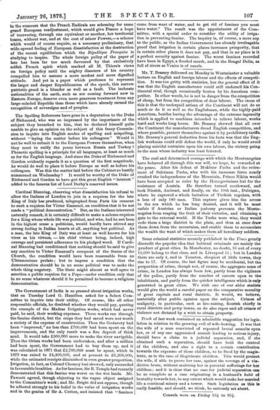The Government of India is so pressed about irrigation works,
that on Tuesday Lord G. Hamilton asked for a Select Com- mittee to inquire into their utility. Of course, like all other responsible officials, he doubted whether they would pay, quoting the example of the Madras Irrigation works, which had never paid, he said, their working expenses. Those works ran through the famine district, but the crops they had saved were not worth a moiety of the expense of construction. Then the Godavery had been "improved," no less than 1700,000 had been spent on the improvements, and the only result was a fine deposit of thick mud. It would take £500,000 more to make the river navigable. Then the Orissa works had been undertaken, and after a million had been spent, the Government had to buy them up, and it was calculated in 1871 that £2,700,000 must be spent, which in 1873 was raised to 24,400,000, and at present to 16,208,000,- while the estimated receipts diminished in even greater proportion. Irrigation, in fact, as Colonel Chesney had showed, only succeeded in favourable localities. As for famines, Sir R. Temple had recently demonstrated that this famine was worst on the wet lands. Mr. Fawcett agreed, though objecting to the vague object assigned to the Committee's work; and Mr. Bright did-not oppose, though he adhered strongly to his belief in the value of irrigation works and in the genius of Sir A. Cotton, and insisted that "famines come from want of water, and to get rid of famines you must have water." The result was the appointment of the Com- mittee, with a special order to consider the utility of irriga- tion in preventing famine. The inquiry is, of course, a mere sop to the public, as the Indian Government has already irrefragable proof that irrigation in certain places increases prosperity, that in certain other places it does not pay, and that in no place is it a perfect security against famine. The worst famines recorded have been in Egypt, a flooded marsh, and in the Bengal Delta, as full of rivers as Venice is of canals.


































 Previous page
Previous page